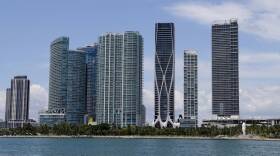-
Longleaf pine conservation is considered a key part of climate resilience for Florida and the Southeast. But when it comes to climate change, longleaf pines are not out of the woods.
-
A new report by scientists from four major Florida universities, says that the wildlife corridor — if completed — will not only allow wildlife to survive in the coming decades, it will make climate change less destructive to humans.
-
Florida may be “ground zero” for climate change, but some environmentalists see the DeSantis administration’s rejection of the money as a partisan move.
-
Dr. Daniel Wildcat suggests the approach of Native peoples offers some viable alternatives to Western European methodologies.
-
Their proposal comes amid continued interest in expanding oil production within the Big Cypress National Preserve, an Everglades wilderness they consider sacred.
-
Climate change is heating oceans faster than the world's coral reefs can handle. So scientists are breeding corals that can withstand hotter temperatures – but only to a point.
-
Burmese pythons are hunted and euthanized in the Florida Everglades due to being an invasive species. Some countries farm python to eat and Australian researchers say its the best meat for the planet.
-
Wetlands have generally kept pace with sea-level rise by building upward and creeping inland a few meters per year. But raised roadbeds, cities, farms and increasing land elevation can leave wetlands with nowhere to go.
-
New research published in the journal Nature showed the potential risk of a one-two combo of sinking land and rising seas to cities along the coast, and Miami topped the list as a location that could see quite a bit of flooded property by mid-century.
-
Emails show the office of Gov. Ron DeSantis suggested wording that would have banned all wind energy in the state.
-
The organism that causes red tide was found at trace levels in three counties last week.
-
FIU researchers are experimenting with "floating wetlands" to improve the water quality of Miami's canals.
Play Live Radio
Next Up:
0:00
0:00
Available On Air Stations











